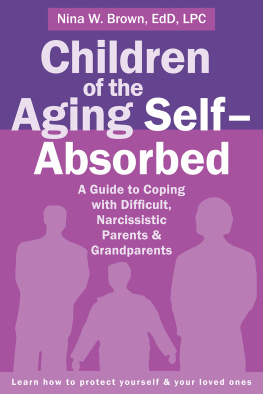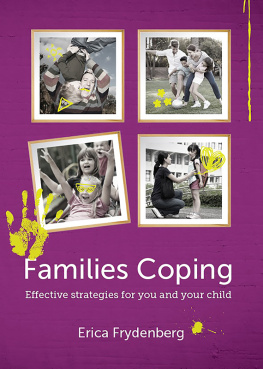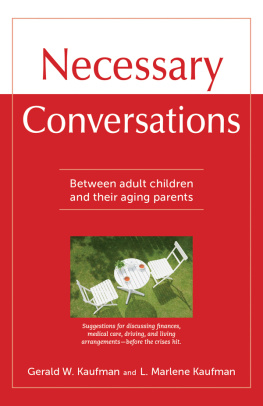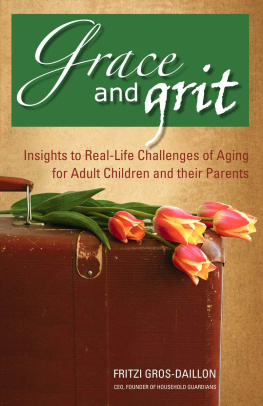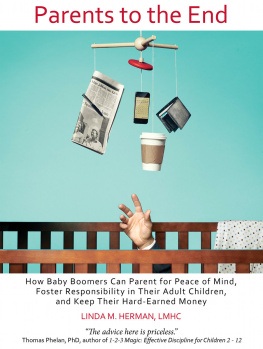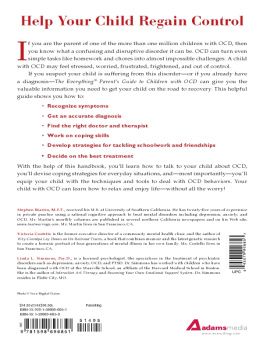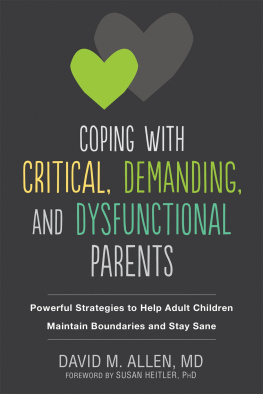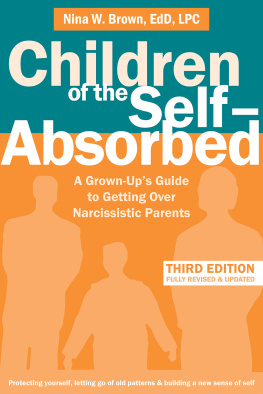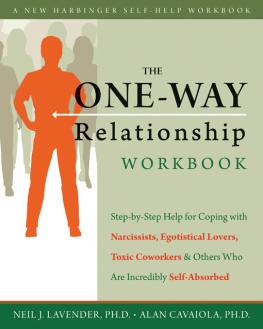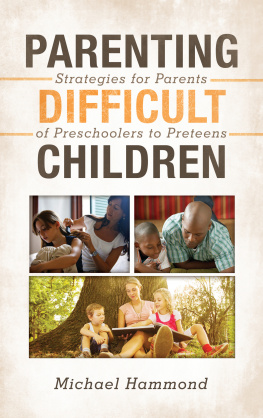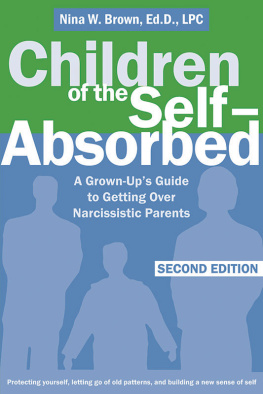Nina W. Brown, EdD, LPC, received her doctorate from the College of William and Mary, and is a professor and eminent scholar of counseling at Old Dominion University in Norfolk, VA. She is former president of the Society of Group Psychology and Group Psychotherapy, and a current commissioner for the American Psychological Associations Commission on Accreditation. Brown is the author of twenty-seven books on group therapy and narcissism, including Children of the Self-Absorbed, Loving the Self-Absorbed, and Whose Life is it Anyway?

Children of the Aging Self-Absorbed fills an important niche in the self-help literature: dealing with aging, difficult, narcissistic parents and grandparents. The book is a guide for adult children of such parents, and offers much wisdom. Brown delineates four types of self-absorbed parentsClingy, Suspicious-Defensive, Arrogant, and Belligerentand provides excellent strategies for managing interactions with each type of parent. The book has useful exercises designed to help readers manage their side of these very difficult relationships more effectively. The overriding message is that the adult child mustand canlet go of hoping to change the parent and instead develop self-protective coping behaviors. This book is a good resource for anyone dealing with an aging self-absorbed parent or grandparent, as well as for therapists helping their clients in such situations.
Eleanor F. Counselman, EdD, ABPP, CGP, LFAGPA, president-elect of the American Group Psychotherapy Association, and assistant clinical professor of psychiatry, Harvard Medical School
Nina Brown lights the way, helping you navigate the roller coaster of caring for narcissistic, aging parents and grandparents. This groundbreaking book introduces valuable exercises and practical advice to strengthen your resilience and protect you from taking in the negativity of your self-absorbed parents.
Ann Steiner, PhD, MFT, CGP, FAGPA, faculty of The Psychotherapy Institute, board member of the American Group Psychotherapy Association, and author of How to Create and Sustain Groups that Thrive
This new text by Nina Brown makes clear the impact of self-absorbed parents and offers some useful techniques about what to do about them. Written in an easily accessible and commonsense tone, [Children of the Aging Self-Absorbed has] something to offer for those with relatively little background in psychology and human development theory, as well as those with considerable experience. Brown takes the reader through the basics of coping with a problem that is faced by a good deal of the early, middle, and later adult population. This text is a useful and practical review of the issues involved with parent-child dynamics in the adulthood years and provides some solid structure for describing, categorizing, and responding to these issues in an effective manner.
Joshua M. Gross, PhD, ABPP, CGP, psychologist and director of group programs at The University Counseling Center at Florida State University, where he practices group and family psychology as well as trains and supervises doctoral and post-doctoral trainees

Publishers Note
This publication is designed to provide accurate and authoritative information in regard to the subject matter covered. It is sold with the understanding that the publisher is not engaged in rendering psychological, financial, legal, or other professional services. If expert assistance or counseling is needed, the services of a competent professional should be sought.
Distributed in Canada by Raincoast Books
Copyright 2015 by Nina W. Brown New Harbinger Publications, Inc. 5674 Shattuck Avenue Oakland, CA 94609 www.newharbinger.com
Cover design by Amy Shoup
Acquired by Melissa Valentine
Edited by Brady Kahn
All Rights Reserved
Library of Congress Cataloging-in-Publication Data on file
ePub ISBN: 9781626252066
This book is dedicated to my family, who continue to give me encouragement, support, and, most of all, joy.
Preface
Aging is a natural part of life and brings many changes to and for each of us. Many of these changes happen gradually over time and may go unnoticed until they reach a certain point where we become aware of them and can no longer deny them. Many books and other resources are available to guide people through the aging process and to provide an understanding of age-related conditions. This book has a different focus: it guides you as the adult child of a self-absorbed parent who is aging, to help you gain a better understanding of how your parents aging may affect his or her already self-absorbed behaviors and attitudes and to provide coping suggestions for how to succeed and thrive in spite of them.
Emphasized are your thoughts, feelings, and reactions, as these are your resources for a constructive building of your self that will withstand the negative impact of your parents behavior and attitudes on your conscious and unconscious self-perception, self-confidence, and self-esteem. The focus will not be on the self-absorbed parent, as your parent is unlikely to change. Unfortunately, there is little or nothing that you can do to promote and encourage positive change for your parent. However, there is much you can do to promote and encourage positive change for yourself.
You may now have a family you created in addition to your family of origin and be concerned about how your self-absorbed parent can and does negatively affect your created family. You may want to protect your family from distressing behaviors and attitudes that youve encountered all your life, as you know very well how hurtful and destructive they can be. This book describes how you can prepare yourself and your family, offers possible interventions when interacting with your parent, and gives some strategies for minimizing your parents negative impact on your family members. Finally, this book is intended to encourage and support you in your own growth and development and to guide you in finding personal solutions.
Chapters 1 and 2 describe some of the concerns and problems with aging that can increase a parents already self-absorbed behaviors and attitudes and cover four types of self-absorbed parents. Chapters 3 and 4 focus on your reactions and thinking processes in response to a self-absorbed parent and on how to be more effective. Chapters 5 through 7 offer some suggestions for how to communicate with your parent and cope. Chapter 8 helps you manage conflict and assaultive confrontations. Chapters 9 and 10 provide you with some additional strategies for protecting yourself and your family members and loved ones. Chapter 11 summarizes how to use the strategies in this book, so that you can reduce or eliminate your self-absorbed parents influence on you, and how to succeed and thrive in your life.
It is my hope that the material in this book will be helpful. While your parents behaviors and attitudes were influential in your development, they do not have to continue to impact you. You can overcome the negative impact and become the person you want to be.
Acknowledgments
It is important to acknowledge the ideas, concepts, and contributions of others who helped in the development of this book. The ideas and concepts developed by mental health professionals through the years, the research on treatment strategies, and my colleagues from the Society of Group Psychology and Group Psychotherapy and the American Group Psychotherapy Association continually trigger a better understanding of difficult and narcissistic people, and I appreciate the work that they do.

